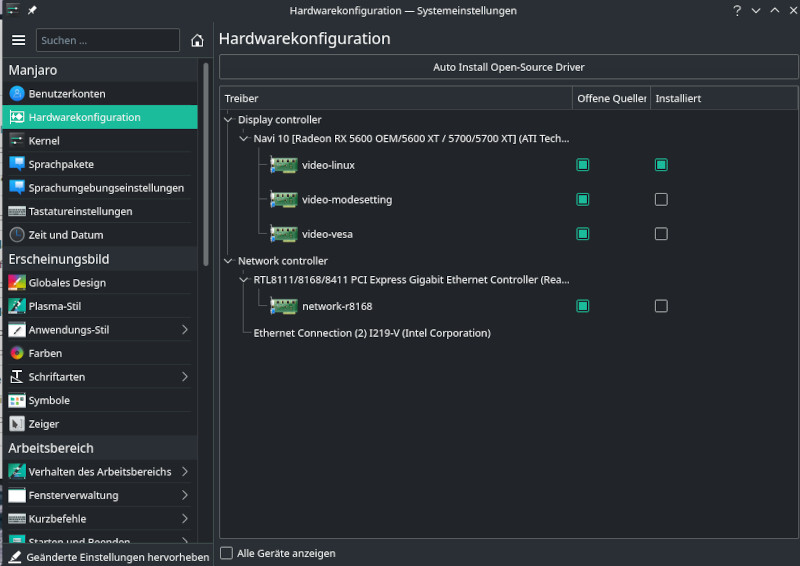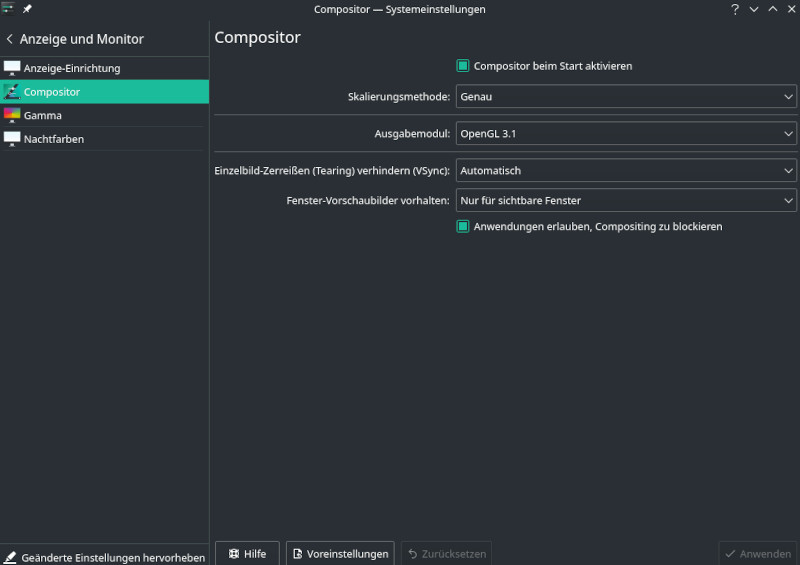Hi folks,
I installed Manjaro on a fresh SSD and a new AMD 5700xt and choose nonfree drivers.
greetings
pobrn
6 January 2021 18:02
2
Please post the output of inxi -Fazy.
[timo@Gemini ~]$ inxi -Fazy
System:
Kernel: 5.10.2-2-MANJARO x86_64 bits: 64 compiler: gcc v: 10.2.0
parameters: BOOT_IMAGE=/boot/vmlinuz-5.10-x86_64
root=UUID=***** rw quiet apparmor=1
security=apparmor udev.log_priority=3
Desktop: KDE Plasma 5.20.4 tk: Qt 5.15.2 wm: kwin_x11 dm: SDDM
Distro: Manjaro Linux
Machine:
Type: Desktop Mobo: ASUSTeK model: ROG STRIX Z370-F GAMING v: Rev X.0x
serial: <filter> UEFI: American Megatrends v: 0616 date: 04/27/2018
CPU:
Info: 6-Core model: Intel Core i7-8700K bits: 64 type: MT MCP
arch: Kaby Lake note: check family: 6 model-id: 9E (158) stepping: A (10)
microcode: DE L2 cache: 12 MiB
flags: avx avx2 lm nx pae sse sse2 sse3 sse4_1 sse4_2 ssse3 vmx
bogomips: 88824
Speed: 800 MHz min/max: 800/4700 MHz Core speeds (MHz): 1: 800 2: 800 3: 800
4: 800 5: 800 6: 800 7: 800 8: 800 9: 800 10: 800 11: 800 12: 800
Vulnerabilities: Type: itlb_multihit status: KVM: VMX disabled
Type: l1tf
mitigation: PTE Inversion; VMX: conditional cache flushes, SMT vulnerable
Type: mds mitigation: Clear CPU buffers; SMT vulnerable
Type: meltdown mitigation: PTI
Type: spec_store_bypass
mitigation: Speculative Store Bypass disabled via prctl and seccomp
Type: spectre_v1
mitigation: usercopy/swapgs barriers and __user pointer sanitization
Type: spectre_v2 mitigation: Full generic retpoline, IBPB: conditional,
IBRS_FW, STIBP: conditional, RSB filling
Type: srbds mitigation: Microcode
Type: tsx_async_abort mitigation: Clear CPU buffers; SMT vulnerable
Graphics:
Device-1: AMD Navi 10 [Radeon RX 5600 OEM/5600 XT / 5700/5700 XT]
vendor: Sapphire Limited driver: amdgpu v: kernel bus ID: 03:00.0
chip ID: 1002:731f
Display: x11 server: X.Org 1.20.10 compositor: kwin_x11 driver: amdgpu,ati
unloaded: modesetting,radeon alternate: fbdev,vesa display ID: :0 screens: 1
Screen-1: 0 s-res: 3840x1080 s-dpi: 96 s-size: 1013x285mm (39.9x11.2")
s-diag: 1052mm (41.4")
Monitor-1: HDMI-A-0 res: 1920x1080 hz: 60 dpi: 92
size: 531x298mm (20.9x11.7") diag: 609mm (24")
Monitor-2: HDMI-A-1 res: 1920x1080 hz: 60 dpi: 92
size: 531x298mm (20.9x11.7") diag: 609mm (24")
OpenGL: renderer: AMD Radeon RX 5700 XT (NAVI10 DRM 3.40.0 5.10.2-2-MANJARO
LLVM 11.0.0)
v: 4.6 Mesa 20.3.1 direct render: Yes
Audio:
Device-1: Intel 200 Series PCH HD Audio vendor: ASUSTeK
driver: snd_hda_intel v: kernel bus ID: 00:1f.3 chip ID: 8086:a2f0
Device-2: AMD Navi 10 HDMI Audio driver: snd_hda_intel v: kernel
bus ID: 03:00.1 chip ID: 1002:ab38
Device-3: Plantronics RIG 800HD type: USB
driver: plantronics,snd-usb-audio,usbhid bus ID: 1-6:3 chip ID: 047f:c043
Device-4: Microsoft Microsoft LifeCam Studio type: USB
driver: hid-generic,snd-usb-audio,usbhid,uvcvideo bus ID: 1-5.4.3:10
chip ID: 045e:0811
Sound Server: ALSA v: k5.10.2-2-MANJARO
Network:
Device-1: Intel Ethernet I219-V vendor: ASUSTeK driver: e1000e v: kernel
port: f000 bus ID: 00:1f.6 chip ID: 8086:15b8
IF: enp0s31f6 state: down mac: <filter>
Device-2: Realtek RTL8111/8168/8411 PCI Express Gigabit Ethernet
vendor: TP-LINK TG-3468 driver: r8169 v: kernel port: d000 bus ID: 07:00.0
chip ID: 10ec:8168
IF: enp7s0 state: up speed: 1000 Mbps duplex: full mac: <filter>
RAID:
Hardware-1: Intel SATA Controller [RAID mode] driver: ahci v: 3.0 port: f020
bus ID: 00:17.0 chip ID: 8086.2822 rev: N/A
Drives:
Local Storage: total: 465.76 GiB used: 36.28 GiB (7.8%)
SMART Message: Unable to run smartctl. Root privileges required.
ID-1: /dev/nvme0n1 maj-min: 259:0 vendor: Samsung model: SSD 980 PRO 500GB
size: 465.76 GiB block size: physical: 512 B logical: 512 B speed: 63.2 Gb/s
lanes: 4 serial: <filter> rev: 1B2QGXA7 temp: 33.9 C
Partition:
ID-1: / raw size: 465.46 GiB size: 457.16 GiB (98.22%)
used: 36.28 GiB (7.9%) fs: ext4 dev: /dev/nvme0n1p2 maj-min: 259:2
ID-2: /boot/efi raw size: 300 MiB size: 299.4 MiB (99.80%)
used: 312 KiB (0.1%) fs: vfat dev: /dev/nvme0n1p1 maj-min: 259:1
Swap:
Alert: No Swap data was found.
Sensors:
System Temperatures: cpu: 29.8 C mobo: 27.8 C gpu: amdgpu temp: 39.0 C
mem: 40.0 C
Fan Speeds (RPM): N/A gpu: amdgpu fan: 0
Info:
Processes: 303 Uptime: 1h 43m wakeups: 5 Memory: 31.29 GiB
used: 4.2 GiB (13.4%) Init: systemd v: 247 Compilers: gcc: N/A Packages:
pacman: 1273 lib: 405 flatpak: 0 Shell: Bash v: 5.1.0 running in: konsole
inxi: 3.2.01
I am new on Manjaro/Linux, sorry.
nonfree = propietary drivers are only a useful option for Nvidia graphic cards, next time select the free version for AMD GPU’s. Luckily, the installer corrects that for you and installed the right driver.
You should install a swap partition or file.
pobrn
6 January 2021 19:54
5
Isn’t it possible that this is caused by some kind of synchronization? Your monitors seem to be configured to 60 Hz, so anything above that is more or less just burning energy. Is this 140 fps noticeably worse than before? Can you possibly run a benchmark that is specifically created to test GPU performance for a more fairer comparison?
It sways between 80-230 fps. With the nvidia gtx 1070ti the fps was arround 230. Hmm which Tool for the Benchmark should I use?

